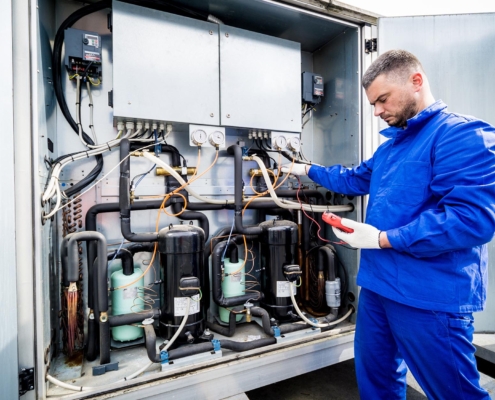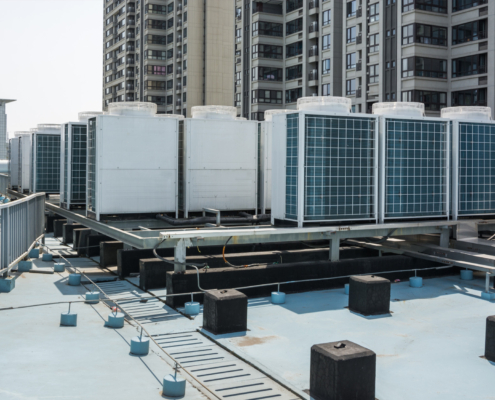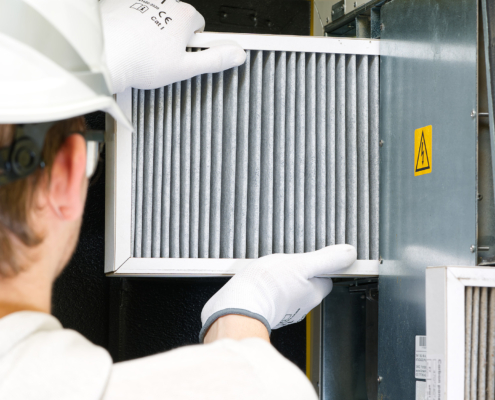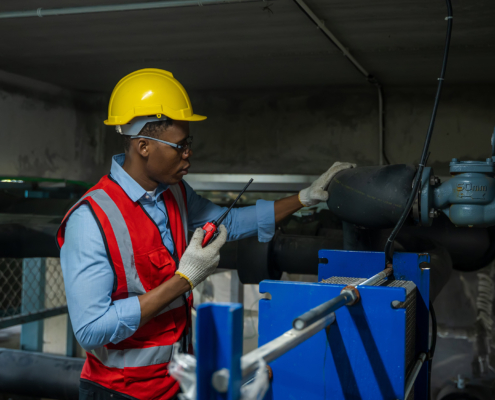 https://sammechanical.com/wp-content/uploads/2025/09/HVAC-systems-on-rooftop-in-the-snow.jpg
1250
2000
AbstraktMarketing
/wp-content/uploads/2024/01/sam-logo-crete-300x154.png
AbstraktMarketing2025-09-23 13:59:372025-09-23 13:59:41Winter Is Coming: How to Winterize Your HVAC System
https://sammechanical.com/wp-content/uploads/2025/09/HVAC-systems-on-rooftop-in-the-snow.jpg
1250
2000
AbstraktMarketing
/wp-content/uploads/2024/01/sam-logo-crete-300x154.png
AbstraktMarketing2025-09-23 13:59:372025-09-23 13:59:41Winter Is Coming: How to Winterize Your HVAC SystemHow to Prevent Commercial HVAC Freezing During the Winter
Winter can be brutal for commercial HVAC systems, especially during prolonged cold snaps. During the colder months, the risk of HVAC freezing becomes a real concern, potentially leading to costly repairs and operational disruptions. However, with the right preventative measures, you can maintain consistent indoor temperatures and ensure your system functions smoothly even on the coldest days.
Let’s explore why commercial HVAC efficiency matters, how freezing issues occur, and practical prevention tips.
The Importance of Efficient Commercial HVAC Systems Throughout Winter
When temperatures drop, a commercial HVAC system works tirelessly to maintain comfortable indoor conditions. An efficient unit is critical for several reasons. First, it ensures employee well-being and productivity. Keeping staff warm in harsh weather boosts morale and reduces health-related absences. Second, reliable heating is often a regulatory requirement in many industries. Spaces such as healthcare centers, retail stores, and commercial and industrial facilities must meet certain standards to keep workers, inventory, and equipment protected from extreme temperature fluctuations.
Lastly, an efficient commercial HVAC system directly impacts your bottom line. Minimizing energy wastage allows you to control operational costs, which is essential in any enterprise seeking to remain profitable during slower winter months. Consistent performance throughout winter safeguards your daily operations and upholds your organization’s reputation.
The Impact of Commercial HVAC Freezing
Even the most robust heating and cooling systems can succumb to HVAC freezing if proper precautions aren’t taken. Components like coils, pipes, and condensate lines are especially vulnerable during harsh winter weather. When ice forms in these areas, your system’s functionality can be severely compromised, leading to fluctuating indoor temperatures, increased utility bills, and, in worst-case scenarios, complete system shutdowns. Here are the most common issues that arise when a commercial system experiences HVAC freezing, along with insights into how these problems can jeopardize your operations.
Frozen Coils and Reduced Heat Transfer
One of the first signs of a freezing HVAC system is frozen coils, typically located in the evaporator or condenser sections. When coils freeze, the system’s ability to absorb and expel heat is greatly diminished. This results in slower warm-up times, inconsistent temperature regulation, and an overworked system trying to compensate for reduced efficiency.
If left unaddressed, frozen coils can strain the system’s compressor and other critical components, leading to permanent damage. In a commercial setting, where consistent heating is vital, frozen coils can disrupt productivity and make the workspace uncomfortable for employees and customers.
Burst or Cracked Pipes
Water expands as it freezes, which can cause pipes or fluid lines within your HVAC system to burst or crack. Even a minor crack can lead to leaks that damage surrounding equipment, walls, and flooring. In commercial buildings with large HVAC networks, a single burst pipe can quickly turn into a costly, time-consuming repair.
Not only do you face direct expenses from replacing damaged pipes, but you could also incur secondary costs from water-related damage to inventory, office furniture, and technology systems. Moreover, shutting down part of your facility for repairs can interrupt business operations, affect client satisfaction, and impact revenue.
Malfunctioning Drain Lines and Flooding
Commercial HVAC systems rely on drain lines to remove condensation and excess moisture. During the winter, these lines can freeze and become blocked. When water cannot drain properly, it may back up into the system or even flood nearby areas. This flooding can damage your HVAC unit, compromise electrical systems, and create health hazards due to mold and mildew growth.
Flooding in utility rooms or maintenance areas could force you to close off critical sections of your building. For businesses that rely on full operational capacity to serve clients—like retail stores and manufacturing plants—malfunctioning drain lines threaten safety and revenue.
Increased Energy Consumption and Operational Costs
When a commercial HVAC system starts to freeze, it typically has to work harder to maintain desired temperature levels. Fans might run longer, compressors may cycle more frequently, and thermostats may struggle to regulate indoor conditions. This additional strain drives up energy usage, resulting in higher utility bills.
Over time, the higher operating costs can become unsustainable, particularly if the root cause—such as insufficient insulation or clogged airflow paths—isn’t corrected. Excessive energy consumption also places unnecessary wear on the system’s components, further increasing the likelihood of breakdowns and expensive repairs.
Possible System Shutdown and Extended Downtime
In a worst-case scenario, significant freezing can force an entire HVAC system to shut down. Parts become unresponsive or severely damaged, making immediate repairs essential before the system can resume operation. For large commercial establishments, a sudden HVAC shutdown is more than an inconvenience—it can halt production lines, create uninhabitable conditions for employees, and potentially violate occupational safety standards.
Extended downtime can mean lost revenue, unhappy clients, and a damaged professional reputation. Keeping your HVAC system in good shape through preventive measures is the best way to avoid a crisis that disrupts your entire operation.
6 Preventative Commercial HVAC Tips for Winter Weather
Proactive maintenance and targeted protective measures can drastically reduce the risk of freezing in your commercial HVAC system. By making a few key adjustments and scheduling routine checkups, you can shield your facility from the consequences of harsh winter conditions. Below are six seasonal HVAC tips to help you maintain a safe and efficient system throughout the coldest months.
1. Prioritize Regular Inspections and Maintenance
Scheduling consistent HVAC checkups—especially before temperatures drop—is one of the most effective ways to catch issues early. Trained technicians can spot worn parts, signs of potential freezing hazards, and other vulnerabilities. By addressing these minor problems proactively, you avoid major complications and costly emergency repairs. Regularly cleaning coils, replacing filters, and lubricating moving parts are foundational steps that ensure steady air circulation and reduce strain on components.
Uncover the importance of routine commercial HVAC inspections and how they keep your heating and cooling systems at peak operating conditions throughout the entire year.
2. Insulate Vulnerable Components and Ductwork
Proper insulation is critical in preventing pipes, coils, and other elements from freezing. Focus on areas that are exposed to the cold, such as exterior duct runs, outdoor units, or pipes near uninsulated walls. High-quality pipe insulation sleeves and thermal blankets can help maintain stable internal temperatures within fluid lines. Additionally, consider insulating or weatherstripping the mechanical rooms or compartments that house vital components of your HVAC system. Keeping these spaces warmer reduces the likelihood of freezing in extreme conditions.
3. Maintain Adequate Airflow
Restricted airflow is a major contributor to freezing. Regularly check your vents, filters, and ductwork for blockages caused by dirt, debris, or obstructions. For heavily used commercial buildings, filters may need replacing more frequently—sometimes monthly or bi-monthly—during high-demand seasons. Ensuring that fans and motors function correctly also promotes consistent air circulation, preventing cold spots where ice is more likely to form. In addition, make sure no large furniture or storage items are placed directly in front of vents or return air grills, as these blockages hamper airflow and strain your HVAC system.
4. Monitor and Regulate Humidity Levels
Excess moisture in the air can exacerbate HVAC freezing issues, especially when it condenses in ductwork and outdoor components. Installing or maintaining dehumidifiers and ventilation systems can help control indoor humidity. Monitoring humidity levels gives you a baseline understanding of your building’s environment, allowing you to make informed adjustments. Reducing excess moisture minimizes the risk of ice buildup and lowers the chances of mold or mildew development—a common secondary issue when freezing goes unchecked.
5. Schedule Defrost Cycles and Backup Heat Options
Many commercial HVAC systems come with built-in defrost cycles, which help prevent ice accumulation on coils. Make sure these cycles are properly configured and functioning. If you’re in an area with extreme cold, consider investing in backup heat options or supplemental heating systems. These can provide extra warmth during critical temperature drops and give your main HVAC unit a break, reducing its workload and preventing freezing. For buildings that operate around the clock—like hospitals or data centers—redundant heating solutions are especially important to ensure uninterrupted service.
6. Create a Winter-Ready Checklist
Establish a routine checklist of winter-readiness tasks for your facilities team or contracted HVAC professionals. This should include verifying thermostat calibration, inspecting outdoor units for snow or ice buildup, and ensuring that emergency power sources are operational. A well-crafted checklist provides clarity, reduces the risk of oversight, and creates a documented history of maintenance activities. By following clear steps each winter, you’ll systematically protect your commercial HVAC from freezing threats.
Prevent Commercial HVAC Freezing With Routine Care From SAM Mechanical Services
Snap freezing can be surprising and unforgiving, but safeguarding your commercial HVAC system doesn’t have to be complicated. By scheduling regular maintenance, insulating critical components, and staying vigilant about airflow and humidity control, you can drastically reduce the risk of your HVAC freezing up in winter weather. When you partner with SAM Mechanical Services, you gain access to expert inspections, timely repairs, and practical advice tailored to your facility’s unique needs. Don’t wait until the next cold snap causes costly disruptions—reach out to SAM Mechanical Services today and enjoy a warm, worry-free winter season.
Share This Post
More Like This
 https://sammechanical.com/wp-content/uploads/2025/09/HVAC-systems-on-rooftop-in-the-snow.jpg
1250
2000
AbstraktMarketing
/wp-content/uploads/2024/01/sam-logo-crete-300x154.png
AbstraktMarketing2025-09-23 13:59:372025-09-23 13:59:41Winter Is Coming: How to Winterize Your HVAC System
https://sammechanical.com/wp-content/uploads/2025/09/HVAC-systems-on-rooftop-in-the-snow.jpg
1250
2000
AbstraktMarketing
/wp-content/uploads/2024/01/sam-logo-crete-300x154.png
AbstraktMarketing2025-09-23 13:59:372025-09-23 13:59:41Winter Is Coming: How to Winterize Your HVAC System https://sammechanical.com/wp-content/uploads/2025/02/Worker-inspecting-commercial-HVAC-unit-on-roof.jpg
1250
2000
AbstraktMarketing
/wp-content/uploads/2024/01/sam-logo-crete-300x154.png
AbstraktMarketing2025-02-25 14:34:152025-02-25 14:34:23The Top Commercial HVAC Solutions for New Hampshire Businesses
https://sammechanical.com/wp-content/uploads/2025/02/Worker-inspecting-commercial-HVAC-unit-on-roof.jpg
1250
2000
AbstraktMarketing
/wp-content/uploads/2024/01/sam-logo-crete-300x154.png
AbstraktMarketing2025-02-25 14:34:152025-02-25 14:34:23The Top Commercial HVAC Solutions for New Hampshire Businesses https://sammechanical.com/wp-content/uploads/2024/12/Worker-looking-over-plans-for-HVAC-upgrade.jpg
1250
2000
AbstraktMarketing
/wp-content/uploads/2024/01/sam-logo-crete-300x154.png
AbstraktMarketing2024-12-10 14:41:512025-05-21 15:50:03The Financial Benefits of a Commercial HVAC Upgrade
https://sammechanical.com/wp-content/uploads/2024/12/Worker-looking-over-plans-for-HVAC-upgrade.jpg
1250
2000
AbstraktMarketing
/wp-content/uploads/2024/01/sam-logo-crete-300x154.png
AbstraktMarketing2024-12-10 14:41:512025-05-21 15:50:03The Financial Benefits of a Commercial HVAC Upgrade https://sammechanical.com/wp-content/uploads/2024/11/Uncovering-the-Benefits-of-Commercial-HVAC-Retrofits.jpg
1250
2000
AbstraktMarketing
/wp-content/uploads/2024/01/sam-logo-crete-300x154.png
AbstraktMarketing2024-11-25 14:44:182025-01-07 15:57:30Uncovering the Benefits of Commercial HVAC Retrofits
https://sammechanical.com/wp-content/uploads/2024/11/Uncovering-the-Benefits-of-Commercial-HVAC-Retrofits.jpg
1250
2000
AbstraktMarketing
/wp-content/uploads/2024/01/sam-logo-crete-300x154.png
AbstraktMarketing2024-11-25 14:44:182025-01-07 15:57:30Uncovering the Benefits of Commercial HVAC Retrofits
The Importance of Regular HVAC Filter Changes: What Everyone Should Know
Commercial HVAC, Residential HVAC https://sammechanical.com/wp-content/uploads/2024/11/Uncovering-the-Innovative-Role-of-Commercial-Smart-Thermostats-1.jpg
1250
2000
AbstraktMarketing
/wp-content/uploads/2024/01/sam-logo-crete-300x154.png
AbstraktMarketing2024-11-21 10:12:142025-04-10 09:10:42Uncovering the Innovative Role of Commercial Smart Thermostats
https://sammechanical.com/wp-content/uploads/2024/11/Uncovering-the-Innovative-Role-of-Commercial-Smart-Thermostats-1.jpg
1250
2000
AbstraktMarketing
/wp-content/uploads/2024/01/sam-logo-crete-300x154.png
AbstraktMarketing2024-11-21 10:12:142025-04-10 09:10:42Uncovering the Innovative Role of Commercial Smart Thermostats https://sammechanical.com/wp-content/uploads/2024/10/working-on-hvac-system.jpg
1250
2000
AbstraktMarketing
/wp-content/uploads/2024/01/sam-logo-crete-300x154.png
AbstraktMarketing2024-10-21 09:59:342025-06-30 13:15:29How Routine Commercial HVAC Maintenance Can Save Your Business Money
https://sammechanical.com/wp-content/uploads/2024/10/working-on-hvac-system.jpg
1250
2000
AbstraktMarketing
/wp-content/uploads/2024/01/sam-logo-crete-300x154.png
AbstraktMarketing2024-10-21 09:59:342025-06-30 13:15:29How Routine Commercial HVAC Maintenance Can Save Your Business Money https://sammechanical.com/wp-content/uploads/2022/11/Person-with-Walkie-Talkie-Inspecting-Basement-HVAC-System.jpg
1250
2000
AbstraktMarketing
/wp-content/uploads/2024/01/sam-logo-crete-300x154.png
AbstraktMarketing2024-08-15 11:49:552025-01-07 15:57:32The Importance of Regular HVAC Inspections
https://sammechanical.com/wp-content/uploads/2022/11/Person-with-Walkie-Talkie-Inspecting-Basement-HVAC-System.jpg
1250
2000
AbstraktMarketing
/wp-content/uploads/2024/01/sam-logo-crete-300x154.png
AbstraktMarketing2024-08-15 11:49:552025-01-07 15:57:32The Importance of Regular HVAC Inspections https://sammechanical.com/wp-content/uploads/2024/08/Seasonal-HVAC-Maintenance-Tips.jpg
1250
2000
AbstraktMarketing
/wp-content/uploads/2024/01/sam-logo-crete-300x154.png
AbstraktMarketing2024-08-15 11:43:522025-09-25 15:57:32Preparing For Changing Weather: Seasonal HVAC Maintenance Tips
https://sammechanical.com/wp-content/uploads/2024/08/Seasonal-HVAC-Maintenance-Tips.jpg
1250
2000
AbstraktMarketing
/wp-content/uploads/2024/01/sam-logo-crete-300x154.png
AbstraktMarketing2024-08-15 11:43:522025-09-25 15:57:32Preparing For Changing Weather: Seasonal HVAC Maintenance TipsAbout
For over three decades SAM Mechanical has provided New Hampshire with the highest quality HVAC, plumbing, and mechanical services.


